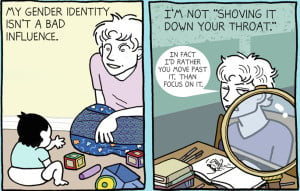I remember vividly when one of my good friends from high school abruptly cut me out of her life.
“She just thinks that you’re—like—a negative person,” a mutual friend told me. “And she’s trying to cut out negative people right now.”
“Negative?” Sure. I was in the midst of a depressive bipolar episode, and I was struggling to keep my head above water.
But defining me as a negative person, as if this episode consumed my whole being? And cutting ties because I wasn’t chipper enough? It felt like I was being told that because I had a mental illness, I didn’t deserve support or friendship.
We had never communicated about boundaries, needs, or space – all of which seemed like a more reasonable approach if my mental health was negatively impacting hers.
One minute, I was her friend – the goofy and cheerful Sam – but the moment I was in a tough spot, I was now classified as a “negative person,” and our friendship expired.
This wasn’t the first time I had heard about this idea of “negative people” and the supposed plague that they brought on others.
But this was the first time I realized that this stereotype about “negative people” often functioned as prejudice in disguise.
***
There is a pretty noticeable trend in self-help these days – categorizing people as either happy or unhappy, with nothing in-between. In this binary, positive people (or those who aspire to be positive) are encouraged to distance themselves from people they see as “negative people.”
This is a narrative that we’re told time and time again – that “negative people” are burdens that dampen our lives and worsen our problems, and that we should all try to be positive.
But stigmatizing negativity often feeds into saneism – or the oppression of people with mental illnesses – because any stereotypes or generalizations about “negative people” will inevitably hurt people who have depression, since they’re often considered one in the same.
It’s reasonable – and often necessary – to cut ties with people who are abusive or toxic. But there’s a difference between removing people from our lives because they’re causing us pain, and ostracizing people who are in pain because we feel overwhelmed or put off by it.
So when we’re talking about “negative people,” we need to be clear about what we really mean. And that’s the problem with the language around “negative people” – it’s unclear at best and harmful at worst.
When we push forth damaging stereotypes and encourage the isolation of folks with depression, this is no longer about self-help. It’s really about hurting and ostracizing people who are struggling.
What do I mean? Let’s look at three lies that we often tell about negative people, and examine why they might be problematic.
1. There Are Positive People, Who We Should Aspire to Be Like, and Negative People, Who We Should Avoid Being Like
Articles like “7 Habits of Chronically Unhappy People” will tell you that we should learn from depressed people by observing their habits, and then strive to do the opposite.
This is code for “Depressed people are terrible. Here are their mistakes for you to learn from so you’ll never be like those people.”
The idea that people with depression exist to teach you a lesson is a problem in itself, but it’s even worse to say that people with depression are a prime example of failure.
Imagine someone defines you strictly on the basis of a mental illness, and then holds up your deepest struggles as an example of ways to be a disappointment. That wouldn’t make you feel too great, right?
The idea that people with depression are strictly negative people – with no layers, emotions, experiences, strengths, or qualities that are worth admiring – ultimately reduces them to their illness and erases their humanity.
It oversimplifies the issue, and it treats people with depression as if they are less-than and not worthwhile people.
2. We Would All Be Happier If We Just Cut ‘Negative People’ From Our Lives
It’s one thing to cut out someone who is abusive or puts you in immediate danger. It’s another matter entirely to cut someone out of your life because they aren’t happy enough for you.
The urge to isolate people who are sad a lot of the time can be strong. Who wants to hang out with someone who is constantly bummed out? It can sap us of our energy, and I know that firsthand.
But cutting ties with someone just because they’re struggling shouldn’t be the first course of action. Establishing new boundaries, creating more space between you, encouraging this person to seek out other resources or supports, or changing the setting in which you hang out can all positively impact your friendship. Cutting ties should be a last resort, not your first choice.
If you feel that you’ve taken on too much by being this person’s support, explicitly communicating your needs is not a bad thing. “I need to take care of myself right now, which I find difficult to do when I spend so much energy supporting you. Is there someone else you can turn to for support right now?”
Remember that you are responsible to your friends, but not for your friends. Communicating your boundaries honors your responsibilities to your friends, but doesn’t require taking on the weight for them.
And the impulse to cut ties with folks who are struggling speaks volumes of how we, as a society, feel about people with depression. They’re burdens and they’re difficult; they aren’t worth our time; they’re a handful; and they don’t deserve our patience, support, or love.
This is not the kind of message we should be giving to people who are already struggling. People with depression are not burdens – they are people.
Practicing honest, open communication is not only a healthier way of negotiating our relationships, but it’s a more compassionate way of engaging with our friends who may be struggling.
3. ‘Negative People’ Are Only Unhappy Because They Choose to Be
Many self-help articles depict “negative people” as folks who choose to see themselves as victims and choose to be pessimistic and sad. But when we’re talking about folks with chronic unhappiness or depression, the reality is that it isn’t something we bring onto ourselves.
No one wants to be unhappy. And if we could choose to be unhappy, why wouldn’t we choose to be happy instead?
This stems back to the belief that depression (or mental illness more generally) is something within our control.
And while we can adapt and cope, depression is not something we choose, and it’s not something we control. Mental illness is not our fault, and suggesting that people with depression are negative by choice is blaming someone for something that they can’t control.
It’s unfair to tell someone who is struggling to just “think themselves out of it.” Mental health is far more complicated than that.
This is one reason why people with mental illness often wait many years after the age of onset before finally seeking professional help; we’re convinced that it’s something we’re doing wrong, and something that we can fix on our own.
Victim-blaming is just one more way that we add to the stigma.
***
Reducing someone with depression from a complex person with dreams, passions, life experience, needs, and talents down to their mood during a particular time in their lives is not just oversimplifying – it’s hurtful.
When my friend cut ties with me because I was having a hard time, I felt dehumanized – like my passion for writing, my strong convictions, my love for laughter and good food, and my curiosity and sensitivity were meaningless because I was experiencing depression.
I went from being “Sam” to being labeled as a “negative person” – and it took everything that I was about, and flushed it down the drain.
I was being told that depression was everything I was.
No one who is struggling with their mental health wants to be told that it’s all that they’ll ever be. And similarly, when we talk about “negative people,” what we’re saying is that people who may be struggling are less-than because of it.
Ultimately, this creates a culture in which folks who struggle with their mental health feel like they have to hide it, or risk being rejected and stigmatized.
Maybe that guy in the office really is just a pessimist. Or maybe it’s something more. Either way, unhappiness is a very human experience – and it should be met with compassion, not judgment or hostility.
[do_widget id=”text-101″]
Sam Dylan Finch a Contributing Writer for Everyday Feminism. He is queer writer, activist, and educator based in the San Francisco Bay Area. In addition to his work at Everyday Feminism, he is also the founder of Let’s Queer Things Up!, his hella queer and very awesome blog. You can learn more about him here and read his articles here. Follow him on Twitter @samdylanfinch.
Search our 3000+ articles!
Read our articles about:
Our online racial justice training
Used by hundreds of universities, non-profits, and businesses.
Click to learn more





















